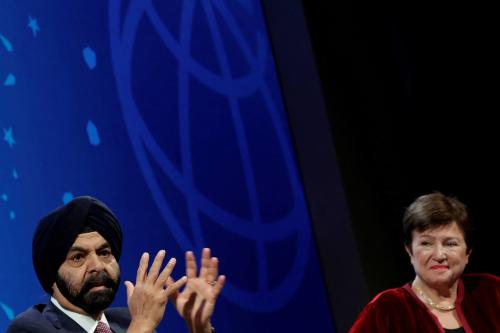Last Monday, Argentina’s debt saga took a new, if not so unexpected, turn of events. After more than 10 years of litigation, the U.S. Supreme Court confirmed Judge Griesa’s original verdict regarding the holdout investors or so-called “vulture funds” (about 2 percent of Argentinean sovereign debt bondholders). The ruling prohibits the Argentinean government from paying its restructured debt holders (whose next coupon payment of $907 million is due June 30) without paying in full (i.e., without any debt haircut) its holdout investors. The amount that the Court ordered to pay to these holdout investors, led by NML Capital, comes out to around $1.5bn. This ruling is based on three specific sovereign debt clauses:
(1) the original sovereign debt issued by Argentina had US jurisdiction, this is why the holdouts’ claim was held by the United States judiciary system;
(2) the lack of a collective action clause (like the one imposed retroactively by the Greek government with the support of the IMF and the ECB in 2011-2012) which allows a supermajority of creditors to agree to a debt renegotiation that is legally binding on all bondholders, including those who vote against the debt restructuring;
(3) a pari passu clause requiring that all of Argentina’s bondholders must be treated alike, which means that the Argentinean government cannot chose who to pay first.
In a nationally broadcast speech on Monday night, President Cristina Fernández de Kirchner declared that she would not allow Argentina to be subject to the “extortion” of the U.S. Supreme Court, particularly given cash payments to the “vulture funds” could establish a legal precedent triggering additional payments to the remaining holders of defaulted bonds (about 6 percent of total bondholders) of around $15bn, or about half of total current foreign reserves at the Central Bank of Argentina. She added that she had already instructed government staff to articulate the means necessary to pay those bondholders who “trusted Argentina,” referring to the 92 percent of bondholders who agreed, in 2005 and 2010, to a debt haircut of more than 70 percent. With even more vehemence than his president, Minister of Economics Axel Kicillof on Tuesday argued that the government was going to pay restructured bondholders in Argentina, under local jurisdiction. Why bondholders would accept this deal, particularly knowing the lack of judicial independence in Argentina, is far from clear.
The Fernández de Kirchner administration’s conspiracy theories no longer have any credibility, even within Argentina. The Court ruling emerges by the simple and to-the-letter application of the law. The debt clauses and specificities described above were accepted by Argentina when issuing debt. While it is true that these clauses were not decided by the Kirchners (since this was outstanding accumulated debt from previous governments), their populist and isolationist policies, together with reform delays and macroeconomic policy inconsistencies over the last decade, are taking their toll.
As I’ve noted previously, the increasing fiscal deficit (and its monetization) coupled with a continuing deterioration in the current account (the so-called “twin deficits”) have been the main drivers of massive losses in foreign reserves at the Central Bank of Argentina, from more than $52bn in 2010 to $28bn today. These losses have come in spite of severe exchange controls; excess of demand for dollars then translates into an exchange rate premium of about 50 percent.[1]
While it is fairly obvious that Argentina is currently in no position to pay $15bn plus to settle its debt commitments, the Argentinean government needs to adhere to the basic international rules of the game, even if that means a renegotiation of the terms of payments with holdout investors. We can hope that Minister Kicillof’s bluster about restructuring the (already restructured) debt to change jurisdictions, which would immediately cause debt default, was just that, as opposed to a conscious policy decision to completely exclude Argentina from international markets.
If worst comes to worst and Argentina actually defaults on its debt, the already critical macroeconomic issues affecting the country will likely become much more severe. Without external financing, there would not be enough funds to finance imports and the growing fiscal deficit. This would immediately translate into higher inflation (which already amounts to 35-40 percent annually) due to the need to increase monetization as a way of financing the fiscal deficit. In turn, this would increase pressure towards depreciation in the exchange rate, and an increase in domestic interest rates (already at exorbitant levels) would crush any incentive to make new investments. All this will impact job creation, long term investment, increase poverty, and impoverish an already weakening middle class. If the Argentinean government wants to avoid this unhappy ending to its debt saga, it’s time it turned the page on policy obstinacy.
[1] Official exchange rate of about 8 Pesos per Dollar and a blue/black market exchange rate of 12 Pesos per Dollar.



Commentary
The Latest Chapter in Argentina’s Debt Saga
June 19, 2014